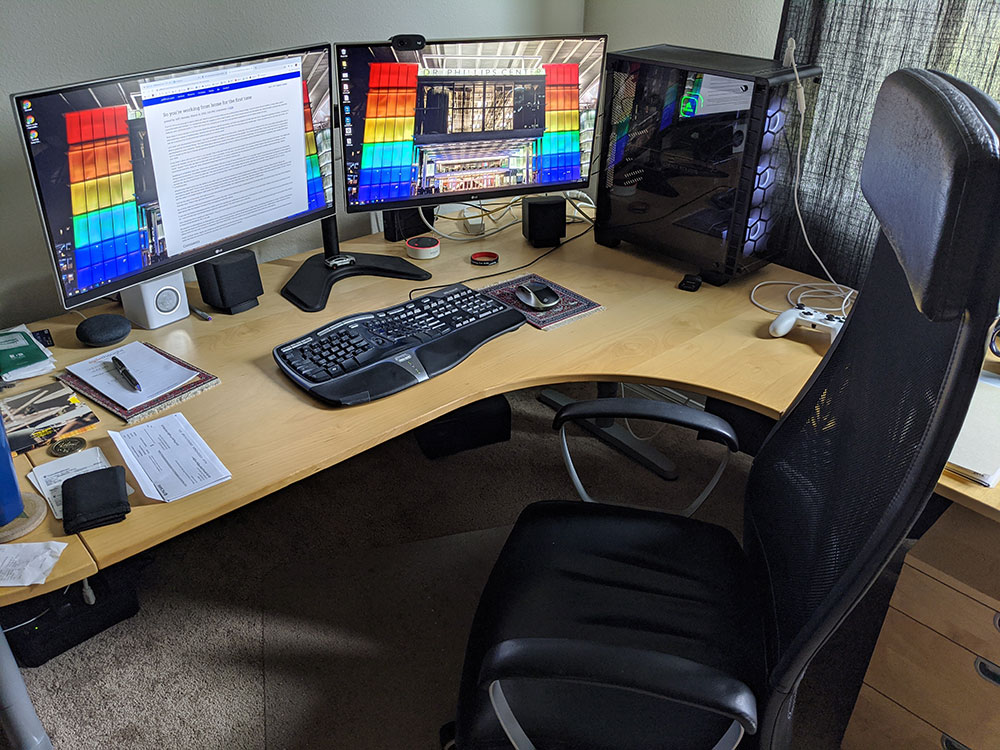So you're working from home for the first time
posted by Jeff | Monday, March 16, 2020, 1:00 PM | comments: 0If you're fortunate enough to have a desk job, there's a good chance that you're working from home today. If you've never done it before, it may seem weird, uncomfortable and strange. I've worked remotely for roughly 6 of the last 8 years, and I find remote work to be far better for mental health, productivity, work-life balance, and I definitely prefer it. There are negatives, certainly, but it can be a net positive experience. Let me share some of mine.
Now, keep in mind, literally no one has ever done this during a global pandemic, so there are aspects of this that are not in anyone's experience locker. Everyone is also enduring a sense of helplessness, anxiety and worries about things no one was thinking about two weeks ago, and you're dealing with that in an isolated way. I have no idea how to roll with all of that. All I can do is account for the physical and cultural aspects of remote work.
Let's start with the physical environment. You can't work from your bed or on the couch. Seriously. One place you sleep in, the other you melt comfortably into a blob to passively do leisure things. You have to sit at a desk or a table or something and be upright. You need a good chair. If you can do it, plug in a big monitor and keyboard to your computer. Really, just think about where you work in the office, and try to have that thing. I'm not saying you never go out to the patio for a spell to break up the day or change perspective, because I've certainly done that in offices with break rooms, beanbag chairs or whatever, but mostly work from your desk.
If you have a door, and you can close it, you should. This is the part that's going to be extra hard if you have kids because they're going to be home. You might just need to be flexible, and ask for a little flexibility from your coworkers. In my case, my wife works for a theater, which means that she's not working, so we're "lucky" I guess? Even still, we have a child with ASD and ADHD, so we have a schedule for him because he can't roll with a totally unstructured day. There's intermittent free time, "phys ed" time, computer-based learning from school, reading, etc.
Speaking of schedules, have one. There was a point where I fell into a trap of over-working, which is to say that I spent more time at my desk but not necessarily being more productive. Countless studies conclude that there is a limitation to productivity for most people, and that more time does not result in more output. I used to roll out of bed at 7, be at my desk by 7:45, and not leave it until 6. I didn't really stop at lunch, I just ate as I worked. I was going at it for 10 hours a day and burned out. My boy would knock on the door at 6 and I'd feel bad that I hadn't stopped yet. Have a stopping point and walk away. Break for lunch and do something else.
Almost every organization has the ability to do video calls now, and you should use video whenever possible. Hangouts, Teams, Slack, Zoom, Skype, etc., everyone has this stuff. If you have a noisy environment (city dwellers especially), use a headset as a courtesy to others, and stay on mute with large groups until you need to speak. But use the video, because it brings context that you can't see with voice only. See how people react when you speak to them. Pro tip: I like to put the video in a smaller window right under the camera when possible, as it approximates "eye contact" a little better.
And for the sake of humanity, don't get on a call with a dozen people (already too large a meeting) and constantly ask who joined every time the chime happens. Nobody cares. They're late, get your business on.
Be on time, make sure that your equipment works before the start. Every software allows you to preview sound and video. Make sure sound in particular is the right device, like the headset instead of the microphone inside the laptop.
If you use any instant messaging service, make sure it isn't putting up notifications when you're sharing your screen. I've seen the embarrassing notification come up, "Joe has body odor and doesn't know what he's talking about." You don't need Joe to see that.
Use a big group video meeting to have lunch. I know, it's kind of gross to watch people eat, but I can tell you that distributed teams get to know each other better in these social situations. No work talk.
Be sensitive to interruptions, or interrupting others. Depending on your job, some people need "maker time," and being interrupted is costly. Software developers can need as much as 20 minutes to get into a groove and be productive, and you don't want to stop that. Mute your own notifications, close Facebook, leave others alone if it can wait. If you're a manager, don't ever think that what you need to do is more important and worth the interruption of your makers.
That's my brain dump. Again, you might be working remotely for the first time under some extraordinary circumstances, so this framework and advice doesn't really take that into account. Good luck, and take care of yourself and your family!
Comments
No comments yet.
